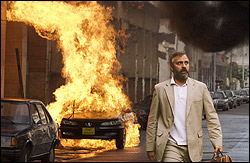Having earned an Oscar for writing Traffic, Stephen Gaghan now looks like the bastard love child of Steven Soderbergh and Noam Chomsky in his second effort as a director, Syriana (which opens Friday, Dec. 9, at the Metro and other theaters). In Traffic, too, many characters from many different countries and social strata were drawn into a web of evil that none of them fully understood. The marvel was that Soderbergh put it all together in whole and intelligible form. Also entertaining.
Syriana suffers from being Son of Traffic, only without Soderbergh as the expert traffic cop. Gaghan is no less ambitious, taking as his subject the almost unfathomable Cheney-esque cauldron of oil, Middle Eastern politics, CIA assassinations, and Islamic terrorism. It deserves to be a TV miniseries, or several, as byzantine as Alias, 24, and The West Wing combined. To simplify greatly, its three heroes are a CIA killer (George Clooney), an oil-industry idealist (Matt Damon), and a Beltway attorney realist (Jeffrey Wright). All of them are in over their heads. Two survive. Only one, perversely, is a success in terms that it might earn him Scooter Libby’s old job.
Clooney’s fat, bearded assassin starts out on the inside—casually blowing up some radicals in Tehran—then gradually goes off the reservation. A Stinger missile disappeared during his Iranian hit, and he’s foolish/ principled enough to worry about it (unlike his more guarded superiors). Damon’s apolitical analyst becomes an insider when abruptly hired—following a family tragedy—by the reformist number-one son of the dying emir of a fictitious petro-nation. (Hence “Syriana,” a state of mind and declining oil production that would alarm Paul Krugman.) Wright’s white-shoe lawyer, meanwhile, treads ever closer, and more cautiously, toward the center of power when asked to vet an oil-company merger with Halliburton-esque overtones.
If this seems dense and confusing to read, on-screen Syriana requires no less concentration. While Soderbergh color-coded the various stories in Traffic, Gaghan supplies a few explanatory intertitles, then starts cutting faster and faster among his three strands, counting on you to make the connections. Here is a movie that could benefit from a director commentary before the DVD is released. I took notes, so I can tell you that Amanda Peet is Damon’s long-suffering wife; Christopher Plummer is Wright’s evil employer; Chris Cooper is a hilariously venal oilman straight outta Crawford; and Tim Blake Nelson is his minion, who declares, “We have laws against it precisely so we can get away with it. Corruption keeps us safe and warm.”
Hold me, Dick; I get shivers when you talk that way.
Syriana takes a tangled approach to a simple argument: Our oil dependency leads us into collusion with the very worst aspects of capitalism, which in turn thwarts any possible democratic reform in the Arab states, which in turn fuels Islamic radicalism and violence. That analysis may be true, but it only goes so far, despite Gaghan’s years of research and evident outrage. (Though Iraq isn’t specifically mentioned here, he’s told the press about Iraqi research subjects who were later killed during the U.S. invasion and occupation.) At one point, he even sits Damon down in the emir’s waiting room next to journalist Jon Lee Anderson (apparently playing himself), whose book The Fall of Baghdad and New Yorker dispatches paint a similarly bleak picture of American policies foundering in the desert.
Gaghan’s indictment is sweeping, not entirely convincing, and hardly news. It’s a paranoid vision of current global events shocking only to those who don’t remember All the President’s Men, The Parallax View, or Three Days of the Condor. You don’t have to support Bush to find it all a little stale—and a little incoherent. It’s like Gaghan created a treatment for his script by combining every story from the front page of The New York Times, circa 2002, without ever following the jump inside to read further. This gives Syriana an incomplete feeling. Wright has an alcoholic father who might be spying on him. Clooney has some grudge with Hezbollah dating back to Beirut in the ’80s, an ex-wife (also a spook) we never meet, and a bitter teenage son who calls him a liar, then disappears. William Hurt suddenly shows up—this year’s designated sangfroid villain, also in A History of Violence—to tell Clooney it’s not just the oil, it’s the 10,000 U.S. troops we’ve got stationed in the emirate that are causing us such grief. (This is also bin Laden’s argument from the first Gulf War, lest anyone forget.) Converting Pakistani kids into suicide bombers seems to involve little more than a soccer match and some references to the Koran and Spider-Man.
Absent here is any mention of Israel’s inflammatory occupation of the West Bank. Nor would Gaghan dare suggest that Islam needs its own Reformation (as Christianity also did before modernity could evolve), or that American petro-espionage schemes, even if real, aren’t the root of all terrorism. And while the Texas oil barons nervously joke that cars don’t run on water, Syriana‘s reach doesn’t extend into our own suburban garages, where our beloved SUVs wait gleaming for their next mile-long trip to Krispy Kreme. Because Plummer, Cooper, and Nelson make so much more deliciously despicable villains than us schlubs clutching the gas pumps and pulling the voting-machine levers.
This is another problem with Syriana. Deglamorized Clooney and de-Bourne-ified Damon and paper-chasing Wright are dull historical players, unlike the villains cavorting in the boardrooms, back rooms, and poolside cabanas. (In the rather similar The Constant Gardner, by contrast, you spent enough time with Ralph Fiennes and Rachel Weisz to care about them.) Gaghan is too much Christopher Hitchens here, not enough Alfred Hitchcock—would it kill him to stop the movies for martinis and sex? Too much of the movie feels like trudging through Foreign Affairs, which makes one wonder what master paranoiac Oliver Stone would’ve done with the same material. Here is a case where art definitely follows life (meaning our current geopolitical reality)—I wish it made more sense.








